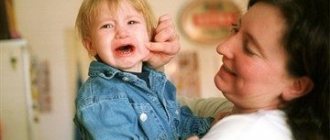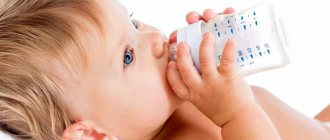Many parents are faced with frequent illness in their children. This problem becomes especially relevant after the baby is sent to kindergarten.
There are a number of reasons for this. Mothers and fathers have a question, if a child is often sick in kindergarten, what to do to strengthen the immune system. First you need to figure out what caused the decrease in protective forces.
This will help you choose an effective method for solving the frequent pain of a kindergarten child.
Why does the baby start to get sick?
Young children have a vulnerable immune system. A cold can be triggered by even a seemingly insignificant factor. A frequently ill child in modern society is not surprising. In most kindergartens, the group includes from 25 to 30 people. Close contact between children contributes to the constant spread of the virus from one person to another.
If a child is constantly sick, the problem may be caused by insufficiently comfortable conditions in kindergarten. Drafts and poor-quality heating are provoking factors. As a result, every season he develops snot and his body temperature increases. In the first year of attending kindergarten, the likelihood of developing ARVI and colds is many times higher. This is due to the adaptation of the body during this period.
How to examine your immune system
The most common cause of frequent colds is severe immunodeficiency. For a complete diagnosis, an examination of the body is carried out. It is equally important to pay attention to symptoms. Signs characteristic of immunodeficiency include:
- increased fatigue;
- decreased appetite;
- frequent colds;
- indigestion;
- sickly appearance;
- tendency to allergic reactions.
The pediatrician examines the baby. A preliminary examination is carried out, after which directions for testing are given. Diagnostics includes biochemical and general blood tests, urine tests, blood pressure measurements and pulse rate checks. If you suspect immunodeficiency, you should also visit an immunology specialist.
Causes of common illnesses in kindergarten
What to do if a child often gets sick in the garden? Of course, look for the reason for this phenomenon. The main provoking factor is the process of restructuring the child’s body to new conditions. For this reason, the child becomes more susceptible to viruses and colds. The most common causes of frequent illnesses in kindergarten include:
- psychological factor;
- poor condition of the premises;
- large crowd of children;
- weakened immune system from birth.
Weak immunity before the garden
In some cases, the child’s immunity weakens even before entering kindergarten. Common causes of this phenomenon include chronic diseases and difficult childbirth. In this case, the child is most susceptible to various diseases. Going to kindergarten only makes the situation worse. It is customary for children with immunodeficiency to undergo appropriate medical therapy.
How to boost your immunity
Pediatricians say that episodes of acute respiratory infections and acute respiratory viral infections should not cause concern. Exceptions include frequent illnesses accompanied by fever and severe complications. In these cases, parents are faced with the task of finding out what to do if their child is often sick in kindergarten. The approach to increasing immune protection must be comprehensive. First of all, the vitamin reserve in the body is replenished and provoking factors are eliminated. Hardening procedures are also practiced. It is highly undesirable to use immunomodulators in childhood.
When are diseases considered “permanent”?
Having experienced one or two illnesses in six months, some parents begin to panic, thinking that their baby is getting sick too often.
They turn to doctors, torture their child, forcing them to take tests and take immunity-boosting drugs. In domestic medicine, a child is considered to be frequently ill if ARVI strikes him more than 6 times a year. In this case, a respiratory viral infection can have various clinical manifestations and cause complications. Doctors include children who are susceptible to frequent and prolonged acute respiratory viral infections into the FSD (frequently ill children) category in order to more closely monitor them.
Reference! Foreign doctors believe that children attending preschool institutions should suffer viral infections up to 10 times a year.
How to protect your baby from illnesses
Parents have the power to prevent the development of colds, thereby avoiding possible complications with their child’s health. The main preventive measures include the following:
- It is necessary to temper the child moderately. But first, this topic is discussed with a pediatrician or therapist.
- There is no need to limit the child's physical activity. Children should run and jump to release pent-up energy and keep their body in good shape.
- It is extremely important to make your baby's diet varied. Including fruits and vegetables in it will replenish your supply of vitamins.
- It is advisable to limit the child’s contact with sick family members.
- It is important to have regular preventive examinations with a pediatrician. They include seasonal vaccinations.
- Parents need to monitor the situation in the children's room. It is necessary to wipe off dust in a timely manner, ventilate the room and ensure comfortable air humidity (50-70%).
Choosing a preschool
It is necessary to take responsibility when choosing a kindergarten. Physical and psychological health directly depends on the atmosphere in the institution. It is recommended to pay attention to the quality of repairs, the professionalism of the staff, food, etc. You need to accustom your child to kindergarten gradually so that he does not have to go through stress.
Strengthening the immune system
Prevention of immunodeficiency is the best way to avoid viral and infectious diseases. It is recommended to avoid extreme temperature changes. Before going outside in frosty weather or cold season, doctors advise lubricating the nasal cavity with oxolinic ointment. It prevents the penetration of viruses. When a runny nose begins, you need to rinse your nose with saline solution. A sore throat can be relieved with a decoction of sage or chamomile.
Clean hands – healthy child
The child should be taught simple hand washing rules. This will provide complete protection against microbes. First of all, we need to remind you that you wash your hands after coming from outside and before eating. On clean skin, potentially dangerous microorganisms die within 5 minutes. These basic rules will help you avoid intestinal infections that contribute to a decrease in immunity.
Microclimate
The microclimate in a room consists of the level of humidity, cleanliness and air temperature. It is necessary to examine the children's room for dust accumulations - children's toys, carpets, bedspreads, etc. It is advisable to clean such items as often as possible. It is recommended to purchase a vacuum cleaner with a water filter. It will make the cleaning process easier. The optimal room temperature is around 22 °C. Air humidity should be at least 50%.
Medicines that don't cure
After a child gets sick, parents immediately try to cure him with the help of medicines. But not all of them are able to change the situation. It is strictly forbidden to use analgin, as it provokes disturbances in the circulatory system. Aspirin should not be used to reduce fever. It is replaced with paracetamol or ibuprofen. Also, you should not resort to interferons, since they are not effective enough for colds.
Flu shot
Preventive vaccination is considered the most suitable way to increase immunity during the cold season. Vaccinations are given to all children in the group, but parents have the right to refuse them. Doctors do not recommend doing this. In addition, it is advisable to vaccinate all family members.
The best age
During the first years of life, all life support systems actively develop. The immune system is developing. On average, this process ends by 6 years. At the age of 7-8, a little person becomes completely ready to be in the company of peers. From a medical point of view, the best age to enroll a child in kindergarten is 5 years old. But this does not mean that you need to refuse to visit him at an earlier age. It is enough to take preventive measures in time.
Love and understanding
For proper development, children require attention from their parents. During the period of sick leave, they need special care. It is necessary to walk more with the baby and play educational games. In this case, he will recover much faster. During the period of recovery from a cold, the sick preschool child is still in a vulnerable state. To avoid relapses, it is important to treat the disease to the end. Proper nutrition, drinking plenty of fluids and stabilizing the nervous system will help with this.
If the baby has started going to kindergarten, there is no need to deprive him of attention. Parental support is especially important in the first year. During this period it is the most painful. If after adaptation the situation does not change, measures should be taken.
How to deal with your child's passive-aggressive behavior
When you see something that looks like passive aggression, you need to slow down, take time to look at the situation carefully, and really be with the child. Oddly enough, direct pressure and attempts to “eradicate” bad behavior only make it worse.
Here, as with neurotic habits, it is very important to understand: direct measures have the opposite result. This is the logic of emotions, it is paradoxical: the more we try to “eradicate” something, the more it worsens and may already be on the verge of pathology. Almost all emotional and behavioral disorders are treated not only by removing the symptom, but also by love and presence.
If you see that you are completely confused, try turning off your mobile phone or tablet for a while. Stay out of range. Reduce work projects to a minimum. Spend one or two days completely with your child. You'll get a bunch of passive-aggressive behavior at first, but it should subside. And during this time you will understand what's what.
Reduce the rhythm, deepen the contact, slow down the pace - this will give the best results. And it will clarify the reason. At 5–6 years old, when the tension passes, the child may be able to talk about his condition. Sometimes this happens later, and he recovers the logic of his childhood aggression only years later.
Advice for parents of non-kindergarten children
It may seem that if children do not go to kindergarten, they will not encounter viral and infectious diseases. In fact, you can get sick even while at home. To prevent this, it is recommended to adhere to the following rules:
- Clothing and shoes should be selected according to the season. Excessive wrapping provokes increased sweating. At the slightest draft there is a risk of developing a cold.
- There is no need to abuse medications in the initial stages of the disease. The body must cope with the disease on its own. Temperatures below 38°C should not be brought down.
- It is necessary to monitor the baby's nutrition, but there is no need to overfeed him.
- During the demi-season period, routine vaccination is required.
- It is recommended to spend more free time with your child. Feeling a lack of attention, he becomes vulnerable. Nervous tension significantly undermines the toddler’s immunity.
- The patient is given hot tea with honey or raspberry jam. During this period, it is important to maintain bed rest. The room is also thoroughly ventilated.
- Self-medication is strictly prohibited. Medicines are taken only after consultation with a doctor.
If feelings cannot be expressed directly
This behavior manifests itself in many different ways. For example, parents are going to visit, but the child says that he does not want to go. Mom and Dad ignore his opinion, because this is a family event. They are dressing the baby, and suddenly, quite by accident, just before leaving, he spills a glass of juice or a cup of jelly on himself. He does not do this on purpose, it is not an obvious, not a systemic conflict, but it is an action that expresses his attitude.
Very often, passive-aggressive behavior can be observed between siblings. For example, a child is born, and at first the mother is immersed in caring for him, paying a little less attention and time to the older one. This is life, this is normal. But the child is small and cannot understand that this “alignment” will not last forever, that the baby will grow up and become his best friend. And so he sits on the rattle and... accidentally breaks it. Or he doesn’t seem to intentionally drop the baby’s pacifier on the dirty floor, or he does something, again unintentionally, that brings discomfort to the baby.
That is, without evil intention, without miscalculation of strategy, he performs some action that expresses his real feelings - those that he cannot express directly. And the younger the child, the worse his command of words and the more likely he will behave in this way.
Behind passive-aggressive behavior there is always some kind of hidden or obvious conflict, suppressed or repressed anger or another emotion, perhaps despair, which the child cannot recognize.











